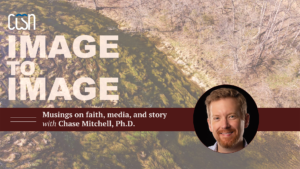 Column: Image to Image: Musings on Faith, Media, and Story
Column: Image to Image: Musings on Faith, Media, and Story
June entry: “An Epic Flight”
Column Description: Image to Image: Musings on Faith, Media, and Story is a monthly column that illuminates old and new ideas about media ecology from a Christian perspective. Dr. Mitchell will explore what it means to bear God’s image and Christian witness in a mediated world, with a particular focus on the relationships between theology, media, and orthopraxy across different Christian traditions.
By Chase Mitchell, Ph.D.
Assistant Professor of Media and Communication, East Tennessee State University
June / April-May / January 2022 / November 2021 / October 2021 / September 2021
An Epic Flight
Then he sent out a dove to see if the water had receded from the surface of the ground. But the dove could find nowhere to perch because there was water over all the surface of the earth; so it returned to Noah in the ark. He reached out his hand and took the dove and brought it back to himself in the ark. He waited seven more days and again sent out the dove from the ark. When the dove returned to him in the evening, there in its beak was a freshly plucked olive leaf. Then Noah knew that the water had receded from the earth. He waited seven more days and sent the dove out again, but this time it did not return to him (Genesis 8:8-12).
In the end, Noah’s dove didn’t return. I like to imagine the bird was dear to their hearts. Maybe Ham or Shem or Japheth, or one of their wives, was responsible for feeding the winged creatures aboard the ark. Maybe they developed a playful report, as humans and animals sometimes do in the give and take of life, especially in close quarters. Maybe they named the dove Feather.
When the time came for Noah to seek respite from the deluge, he called on the ark’s avian stock—a raven and Feather—as sentinels. Scripture tells us that the raven “kept flying back and forth until the water had dried up from the earth” (Genesis 8:7). But the dove ultimately left for good. Feather’s final departure points to something more.
I saw the Spirit come down from heaven as a dove and remain on him (John 1:32)
Feather? No. And yet, yes. Obviously, Jesus’s earthly baptism and ministry happened thousands of years after the ark made landfall on Mount Ararat. Temporally, historically, it is impossible—and slapstick—to suggest that God gifted Noah’s actual dove with millennia life years so it would alight on Jesus in the Jordan. But I discern resonance here. In being sent, Feather sought haven, life, salvation; the bird’s spiritual descendant found it in Jesus. The two doves are one in the heart of grace.
I glimpse the creaturely joy of the dove at Jesus’ baptism, drawing on a deep well of primordial memory, preserved in its dove-ness across eons of mundane, dovely existence. I know this Man. I fly to Him. I’ve always flown to Him.
Communication professor and author Dennis Cali has written about the sacramental view of reality. This mode of perception “expresses a kind of faith that the divine, the inchoate, the supernatural communicates on the secular, the physical, the natural level and that all of life is infused with the divine, is charged with the supernatural, is sacramental.”[1] Perceiving the mundane sacramentally is no mere summation of sensory parts, nor intellectual technique. Rather, it is the manifestation of God’s presence in ways that transfigure vision and transcend nature. As Frederick Buechner aptly writes in The Alphabet of Grace, “A miracle is when the whole is greater than the sum of its parts.”[2] Indeed.
J.R.R. Tolkien, who Cali refers to as a “sacramental artist” (p. 146), said somewhere that the difference between adventure and epic is that in the latter, the hero doesn’t return. They are transformed in such a way that going back is no longer possible. The Hobbit, an adventure, is a tale of there and back again. In The Lord of the Rings, an epic, Frodo doesn’t return to the Shire but departs for the Undying Lands. Feather’s flight—like Frodo’s and mine and yours—is epic. It is sacramental. It is revelatory. It is more than the sum of its parts. It is life itself.
Notes
[1] Dennis D. Cali, “The Sacramental View of Marshall McLuhan, Walter Ong and James Carey,” Explorations in Media Ecology 16, no. 2+3 (2017): 140.
[2] Frederick Buechner, The Alphabet of Grace (New York: HarperCollins, 1970), 60.
